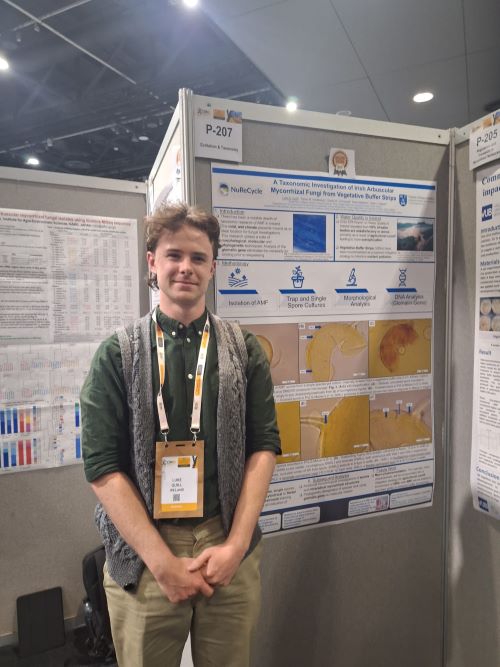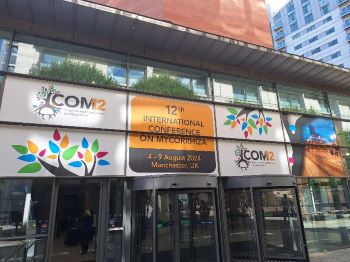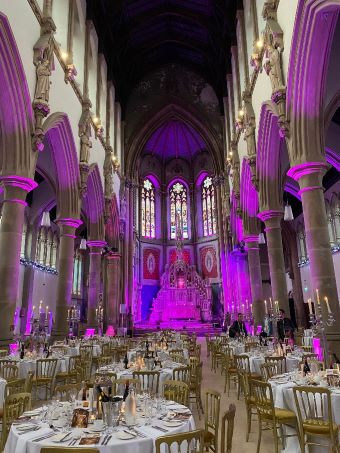My name is Luke Quill, and I am currently in the 3rd year of my PhD at the Botany Department of Trinity College Dublin. 
My research focuses on identifying and characterising arbuscular mycorrhizal fungi in agricultural soils in Ireland, both at the community and species levels. This year, I was honoured to receive the Ken Haynes Travel Award from the Irish Fungal Society, and I am deeply grateful to the selection panel for choosing me. This award allowed me to attend the 12th International Conference on Mycorrhiza (ICOM-12) in Manchester, UK, an invaluable experience for advancing my academic career.
Held every two years, ICOM-12 is at the forefront of mycorrhizal research, drawing mycologists from across the globe to share the latest discoveries and innovations. The diversity of research was truly impressive, offering a glimpse into some of the cutting-edge work happening in the field. The conference kicked off with a keynote from Sir David Read, a pioneering figure in the mycorrhizal world whose influence has shaped the careers of almost everyone at the event! His book, Mycorrhizal Symbiosis, co-authored by Dr. Sally Smith, is a cornerstone of the field, inspiring an entire generation of researchers. Having the opportunity to hear him speak in person was a highlight of the event.
At ICOM-12, I had the exciting opportunity to present my latest findings, which included the discovery of a seemingly undescribed species of arbuscular mycorrhizal fungi. I had isolated this unique specimen from a vegetative buffer strip earlier this year. My poster not only highlighted the taxonomic aspects of this work, but also delved into its future prospects. One of my key goals is to incorporate it into a myco-phytoremediation experiment, harnessing the synergistic relationship between plants and fungi to enhance nutrient uptake and thus reduce nitrogen and phosphorus loads in runoff. I had some fantastic discussions with fellow researchers about these ideas, sparking new collaborations and insights.
Even though the conference spanned an entire week, it quickly became clear that it would be impossible to attend all of the sessions that I wanted to catch. That said, I thoroughly enjoyed the sessions on Mycorrhizas in Ecosystem Functioning, Environmental Change, Evolution & Taxonomy and Management & Applications. One workshop that particularly stood out to me was the Molecular Ecology of Arbuscular Mycorrhizal Fungi. Since working with the genome of arbuscular mycorrhizal fungi is notoriously tricky, researchers have historically targeted different gene regions for community analyses, which makes comparing genomic data quite difficult. The workshop featured debates on the gene region that we as a community should target going forward, though a consensus seemed to allude us. Maybe by the next ICOM we’ll be closer to a unified approach!
However, ICOM-12 wasn’t all about research. The networking dinner took place at the magnificent Gorton Monastery, a stunning example of Gothic Revival Architecture. After the dinner we were treated to a Scottish Céilí with a live band, giving me the chance to really shine!
The conference wrapped up with an inspiring talk from Dr. Chris Walker, the 2024 awardee of the Eminent Mycorrhiza Researcher Award. A titan of the field, Dr. Walker has consistently made groundbreaking contributions to mycorrhizal taxonomy over the entirety of his academic career. His closing talk was the perfect finale to ICOM-12, taking us through his academic journey, which, much like the hyphal networks that he so closely studied, had intricately woven itself into so many aspects and memories from his life. I am extremely grateful to have been given the chance to attend this fantastic conference. A heartfelt thanks to the Irish Fungal Society for making this experience possible, and to the Kinsella E3 Multi-Disciplinary Awards for supporting the research that brought me here.
Gorton Monastery. Photo credit: Catalina Guerra, PhD

